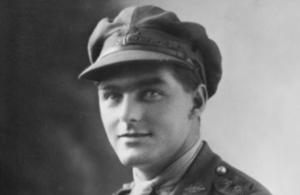Ww1 australian vc recipient percy valentine storkey
- Select a language for the TTS:
- UK English Female
- UK English Male
- US English Female
- US English Male
- Australian Female
- Australian Male
- Language selected: (auto detect) - EN

Play all audios:

Case study WW1 AUSTRALIAN VC RECIPIENT PERCY VALENTINE STORKEY The story of Australian First World War Victoria Cross recipient Percy Valentine Storkey. 66 men from Australia received the
Victoria Cross, Britain’s highest award for gallantry, during the First World War. As part of the Centenary Commemorations the people of the United Kingdom marked their gratitude to those
courageous men by presenting a bronze memorial plaque to their home country engraved with their names. The plaque is now displayed at the Australian War Memorial. This archive tells their
stories. NAME: PERCY VALENTINE STORKEY DOB: 9 SEPTEMBER 1893 PLACE OF BIRTH: NAPIER, NEW ZEALAND DATE OF ACTION: 7 APRIL 1918 PLACE OF ACTION: HANGARD WOOD, FRANCE RANK: LIEUTENANT REGIMENT:
19TH BATTALION, AUSTRALIAN IMPERIAL FORCE Percy Valentine Storkey was born on 9 September 1893 in Napier, New Zealand, but moved to Sydney, Australia in 1911 and enrolled in law school
there in 1913. He enlisted in the Australian Imperial Force in May 1915 and was sent with the 19th Battalion to the Western Front where he was wounded twice, including at Passchendaele.
Lieutenant Storkey was awarded his Victoria Cross for his actions on 7 April 1918 at Hangard Wood, near Villers-Bretonneux. His citation reads: > For most conspicuous bravery, leadership
and devotion to duty when > in charge of a platoon in attack. On emerging from the wood the > enemy trench line was encountered and Lt. Storkey found himself with > six men. While
continuing his move forward a large enemy party about > 80 to 100 strong armed with several machine guns was noticed to be > holding up the advance of the troops on the right. Lt.
Storkey > immediately decided to attack this party from the flank and rear, > and while moving forward in the attack was joined by Lt. Lipscomb > and four men. Under the leadership
of Lt. Storkey, this small party > of two officers and ten other ranks charged the enemy position with > fixed bayonets, driving the enemy out, killing and wounding about > thirty,
and capturing three officers and fifty men, also one machine > gun. The splendid courage shown by this officer in quickly deciding > his course of action, and his skilful method of
attacking against > such great odds, removed a dangerous obstacle to the advance of the > troops on the right, and inspired the remainder of our small party > with the utmost
confidence when advancing to the objective line. Storkey was presented with his Victoria Cross by King George V at Buckingham Palace. After the war, he returned to Australia and qualified as
a lawyer, later becoming a judge. In 1955, he retired to England with his English-born wife. He died in Teddington in 1969. UPDATES TO THIS PAGE Published 20 June 2016